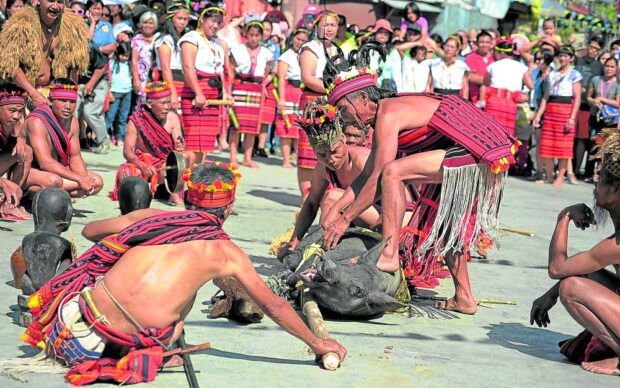No funds set for autonomous Cordillera – Bagiuo Rep. Marquez Go

WAY OF LIFE | The Cordillera hosts the biggest cluster of indigenous peoples communities in Luzon and is entitled to its autonomous government by the 1987 Constitution. These communities, through the counsel of clan elders, had been guided by their own set of governance and values before the Philippine government was formed. This photo of a Cordillera community gathering was taken in 2016. (File photo by EV ESPIRITU / Inquirer Northern Luzon)
BAGUIO CITY, Benguet, Philippines — The mountainous Cordillera is relying on the latest congressional initiative to make it an autonomous region as mandated by the 1987 Constitution but the road to autonomy may be blocked by funding issues.
A joint position paper issued last month by the nation’s top finance managers said the national government could not yet afford to provide the proposed Autonomous Region of the Cordillera (ARC) a 10-year block grant of P75 billion, as provided by House Bill No. 3267, said Baguio Rep. Marquez Go, one of the bill’s sponsors, in an interview on Friday.
The government is still coping with the lingering impact of the COVID-19 pandemic and the Supreme Court’s Mandanas-Garcia Ruling, which expanded the sources of revenues shared by towns and provinces, made it harder to source funds for an ARC, said Go.
The high court’s 2018 decision favored the arguments of former Batangas governors Hermilando Mandanas and the late Enrique Garcia that local governments were entitled to all taxes collected by the government and not just collections by the Bureau of Internal Revenue (BIR).
It reduced the national government’s revenue shares beginning in 2021, with an additional P263 billion allocated to local governments, including those in the Cordillera.
Article continues after this advertisementBut the position paper issued by Finance Secretary Benjamin Diokno, Budget Secretary Amenah Pangandaman, and Socioeconomic Secretary Arsenio Balisacan will not stop the ARC from being formed, Go clarified.
Article continues after this advertisement“They just asked Congress to understand the fiscal implications of its bureaucracy and the block grant it requires,” he said, should HB 3267 become law and be ratified by the highland region.
The finance experts said the country’s fiscal position could be stronger by 2029, but “that did not mean we have to wait for five years before we proceed [to legalize the formation of ARC],” Go said.
High-impact projects
Under HB 3267, ARC will get its own income through revenue-generating projects and local taxes, apart from shares in national government and private-funded projects situated in the region.
The block grant would be spent on high-impact development projects like energy generation in order to jump-start a newly independent economy, Stephanie Christiansen, Cordillera assistant director of the National Economic and Development Authority, has said in a March forum discussing scenarios concerning ARC’s fiscal viability.
Once the ARC is formed, she said the regional government should quickly invest “in big-ticket economic development programs and high-impact environmental projects.”
Go said a technical working group has been formed to seek a way through HB 3267’s financial obstacle, while Cordillera lawmakers review the draft autonomy bill.
The bill—filed in 2020 by Go and Representatives Allen Jesse Mangaoang (Kalinga), Menchie Bernos (Abra), Eleanor Bulut-Begtang (Apayao), Solomon Chungalao (Ifugao), Maximo Dalog Jr. (Mountain Province) and Eric Go Yap (Benguet)—was being studied by the House committee on appropriations.
Go said autonomy advocates would work hard to protect the constitutional provision, which entitles the Cordillera to an autonomous government, “although there are no moves to change the Constitution at the moment.”
Rejected
Section 15, Article X of the Constitution requires the creation of autonomous regions in the Cordillera and Muslim Mindanao, where people share “common and distinctive historical and cultural heritage, economic and social structures.” But only the 2006 Autonomous Region of Muslim Mindanao (expanded in 2019 to the Bangsamoro Autonomous Region of Muslim Mindanao) was formed.
The Cordillera is currently an administrative region (CAR) composed of Baguio City and the provinces of Ifugao, Benguet, Apayao, Abra, Kalinga, and Mountain Province, which President Corazon Aquino formed on July 15, 1987, after forging a “sipat” (cessation of hostilities) with the late rebel priest Conrado Balweg.
CAR serves as a transitional region tasked to prepare its residents for autonomy. But two autonomy laws were rejected in their 1990 and 1998 referendums. Subsequent bills establishing a third Cordillera autonomy law failed to pass Congress. Cordillera lawmakers were unable to secure the full backing of former presidents like the late Benigno Aquino III, the son of Mrs. Aquino and Rodrigo Duterte.